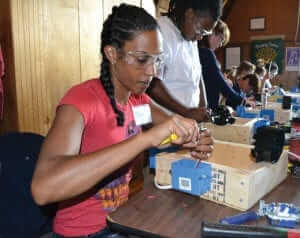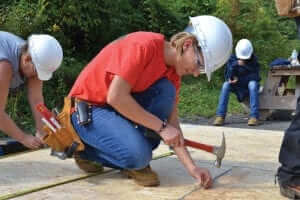West Virginia Women Work has given thousands of low-income women the skills and confidence to make a living in a nontraditional field. Now, it might have to close its doors.

Let’s try a thought experiment. Imagine a job field where the demand for workers is high, the barrier for entry is low, and the pay is good. The jobs are upwardly mobile, too. You can climb up the career ladder as you get more experience and more training, until you’re eventually making even better money, often something like $50,000 a year. You don’t need a lot of fancy schooling to do these jobs, and it’s not difficult to get your foot in the door—entry-level positions are readily available for people who don’t have any work experience in the industry.
Sounds great, doesn’t it? It sounds like the type of job field that all kinds of workers would flock to in large numbers. Now imagine all the people working in this industry are men. Or most of them anyway—all but around 10 percent. I know what you’re thinking: How could that be? Why are all the women in the world letting these lucrative and plentiful jobs pass them by?
That’s a good question, and here’s the answer: Because this lucrative field is construction, and women don’t generally work construction jobs. Of course, that isn’t really an answer at all, or at least it’s a very bad one. Women can and do hold construction jobs. They can—and do—build entire careers in that industry. Just not very many women do. Some would argue not enough.

West Virginia Women Works bills itself as two things: a “pre-apprenticeship” program in the building and construction trades, and a ticket out of poverty for West Virginia women. Students spend 11 weeks in the program learning the basics of carpentry, plumbing, and electrical wiring, earning preliminary licenses in each. Normally a job seeker doesn’t need that type of license to get an entry-level construction job—if that job seeker is a man. But if you’re a woman looking for a traditional job in one of these male-dominated fields, it helps to have it. “It’s harder for women when they’re looking for these jobs,” says Misty Nicholas, a graduate of the program who now works there as a coordinator. “But in my experience, once you go in there and show your licenses and everything else, I think it’s all equal. It’s very impressive when they walk into an interview with all their certifications, their licenses, a resume.” There’s proof this technique works. The last graduating class Nicholas oversaw had a 90 percent job placement rate.
Graduates include people like Georgia Day, who relied on public assistance to help support herself and her young son when she was working as a cleaner. She applied for the program in 2014 and called the office every day until she got an interview. Once accepted, she never missed a day of class and read all of the assigned material—plus extra texts she found in the local library. When she graduated she found work as a laborer, and within a week her boss reported back that she was the hardest worker on the job site. She’s now in the first year of a plumbers apprenticeship program and makes $15 an hour. Or there’s Ashley Hayes, who had an associate’s degree in criminal justice but couldn’t find work. She resorted to selling drugs for money and was eventually convicted on a felony distribution charge. After prison the only jobs for a person with her background were in the food service industry, where even a full-time job couldn’t support her husband and two children. But during the program she realized how much she enjoyed electrical wiring and set about finding a job in that field. She succeeded even before she’d graduated, leaving West Virginia Women Work early to start working.

It helps to have those numbers fresh in your mind when you learn this next thing about West Virginia Women Work: It might have to close its doors at the end of this year. Funding for the program has always been tenuous. It is completely funded by grants, which means that the amount of money coming in naturally waxes and wanes over time. That approach has worked for 15 years—until now. “Every year it’s a struggle, but this year in particular the grant funds are lower,” Ganel says. “And now we’re in a position where we’re going to have to close our doors in December if nothing else comes in.”
To shore up their resources, officials are looking to the state for help. The government has money for economic development, but most of that goes to career and technical education in public schools or universities, or other state-run training programs. Gunel hopes state officials might find a way to funnel some money into West Virginia Women Work. “I feel like we’ve proven ourselves over the years, we’ve proven we’re doing a good job,” she says. “And I’m hoping that if the state sees that we’re really helping not only women and families out, but we’re helping the state out, maybe they’ll see that if they have some resources that could be good for our nonprofit they would help the state too.”
Written by Shay Maunz
Photo courtesy of West Virginia Women Work











Leave a Reply